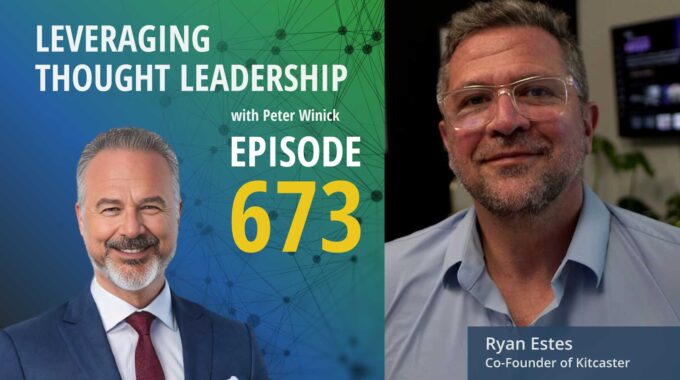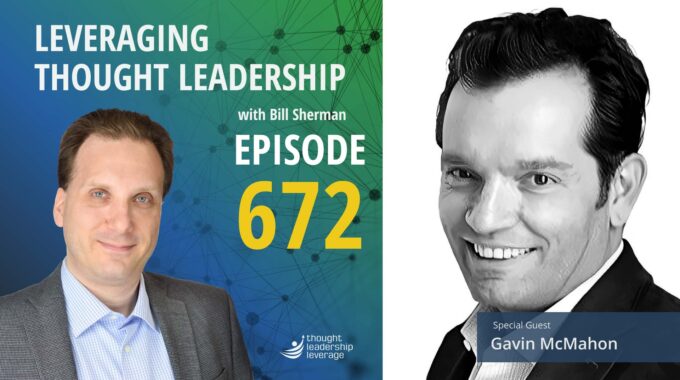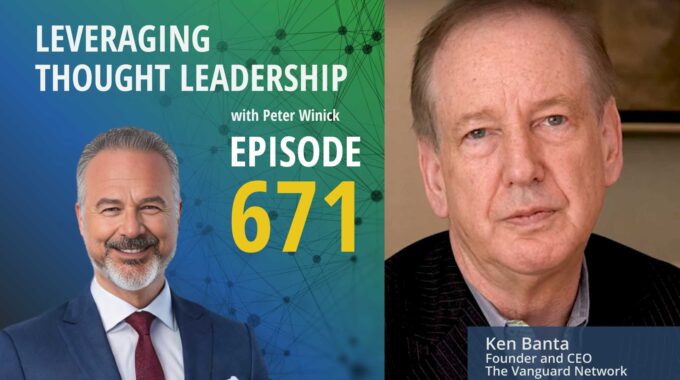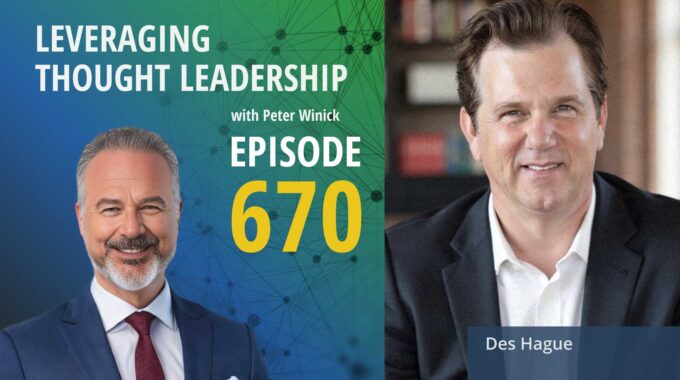Founder-led marketing, podcast strategy, and the art of authentic conversation What makes a podcast truly…
Thought Leadership Excellence | Tom Peters
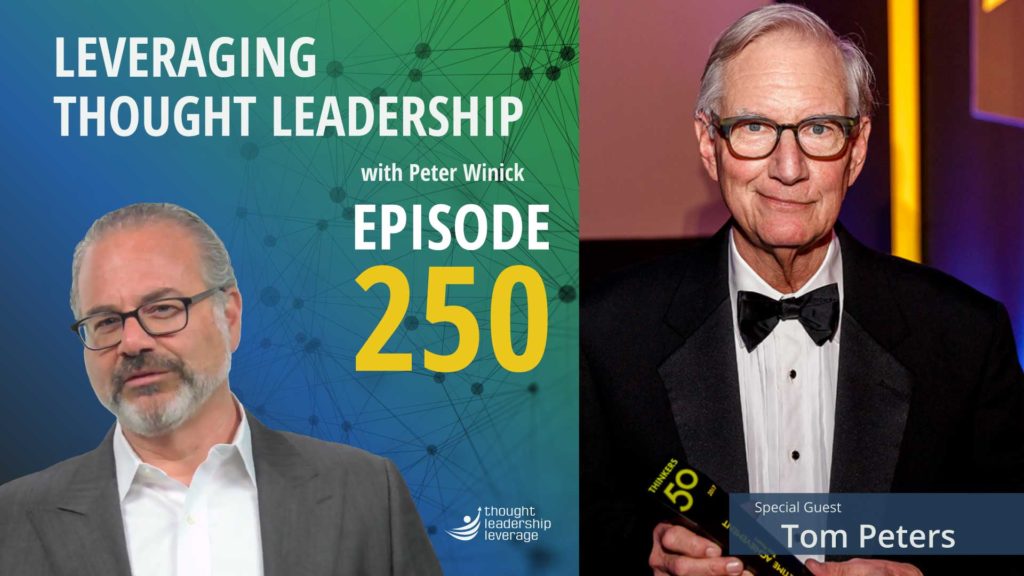
The evolution of excellence.
An interview with Tom Peters about writing, speaking, and how your thought leadership can be misinterpreted.
Wow— It’s been 2 and a half years of doing the podcast and I’m honored to have had the privilege of interviewing so many world-renowned thought leaders. I’m proud to present to you our 250th episode today featuring none other than Tom Peters. Thanks to all of my guests and listeners for making the podcast a success. I hope that many thought leaders, authors, academics speakers, and organizational thought leaders continue to achieve the impact and leverage they wish from their work.
Tom Peters is the co-author of In Search of Excellence—the book that changed the way the world does business, in addition to seventeen other books that have sold more than 10 million copies combined and recipient of the Thinkers50 Lifetime Achievement Award.
Tom shares candid stories of his time writing In Search of Excellence. He explains how it found success amongst an audience that no one was targeting at the time, despite many expecting the book to be a failure. We discuss his article The Brand Called You, how it changed the way people market themselves, and how many who’ve read it have actually missed the true meaning.
Don’t miss this fascinating conversation with one of the most prolific business authors and speakers in the world.
Three Key Takeaways from the Interview:
- How timing can play a big part in the success of your thought leadership.
- Why you can’t be mad at others when they misinterpret your thought leadership.
- What you need to do to make your thought leadership invaluable to your organization.
Transcript
Peter Winick Welcome, welcome, welcome. This is Peter Winick. I’m the founder and CEO of Thought Leadership Leverage. And you’re joining us on the podcast today, which is Leveraging Thought Leadership. I’m absolutely honored to have our guest on today who needs no introduction, but I’ll give you a brief one anyway, because I found some interesting nuggets on Tom. So today our guest is none other than Tom Peters, who’s the author of Among, amongst other things, in Search of Excellence and a brand called You. And I’ll give you just one little snippet from his bio other than one of the quotes I liked, which is Tom Peters is the Red Bull of management thinkers. I think it was a great quote, but let me give you just a sense of the span and scope of the and the depth of Tom’s work. So in over 40 years, he’s done over 25,000 speeches in 50 states, 67 countries in front of about 5 million people, 7500 flights. Remember flying? That used to be fun. 5 million miles, 17 books, numerous e-books, over 10 million books sold, 3000 blog posts, 75,000 tweets. It goes on and on. So it is an absolute honor and a privilege to have you on today. Tom, how are you today?
Tom Peters I’m good, But I am going to correct one thing.
Peter Winick Okay?
Tom Peters I am not quite bionic, man. It’s 2500 speeches, not 25,000.
Peter Winick 2500 speeches. Okay. Well.
Tom Peters I mean, no, when you said 25,000, I suddenly got exhausted and tired and I thought, my God, that would be that would be that would be about two a forever.
Peter Winick Where you check your bank account and said where the money go. Right? Yeah. So let’s dive in. We were chatting for a moment before and you and you sort of jokingly said, well, I don’t even know what the heck a thought leader. And so let’s figure that out. So I would argue on a lot of levels that you’re clearly a thought leader and you’ve had, you know, your path coming out of McKinsey and then moving into this space. You moved into this space before. It was really a space. Now it’s a pretty common path that people take. But tell us about your journey from maybe sort of McKinsey to your initial couple of years post McKinsey.
Tom Peters Well, in some respects there’s not much to say. And what I mean by that is with my coauthor Bob Waterman, I wrote in Search of X, co-wrote in Search of Excellence. The publisher’s assumption was that it was a dreary, dry business book wouldn’t sell worth a damn. The first print run was 3000, and books at the time were going hardback, so they were 995 and they jacked ours up to 14 bucks. And they said, Look, nobody’s gonna buy the damn thing, but if they do, it’s people and they don’t care whether it’s ten bucks or 14 bucks. And then the gods innovate. And it’s really true. I’ve said to many people, I do not like mass murderers. I do not like rapists and child abusers. And number three on my list of things I don’t like is successful people who think they deserve their success. Yeah, it’s not 99%. It’s in search of excellence. And nothing wrong with the book. It’s a good book with perfect timing right there with it. I know that we understand this more as you and I speak than we did then, but we were in the pits of a pretty nasty economic contraction. And President Reagan, the week the book came out, announced 10% unemployment for the first time since the Great Depression. And, you know, we’re going through it again right now. But, you know, I said to somebody before in Search of Excellence came out, the business books were all in the back of the store and the depression came along or the near depression, the mega recession. And suddenly they were all in the in the front of the store. So, you know, the timing was perfect. And then the phone started to ring. It was it was well, to be fair book came out and a to Bob Woodward and I started the research at McKinsey in 77. And with my ANZ clients and others, I had built up a pretty decent portfolio of speed. But, but the point that you made, which is interesting, at least to me and perhaps to you, is there, you know, if, you know, I was joking with you about thought later, but if somebody had said the guru industry in 1982, people who thought there was no such thing.
Peter Winick Right.
Tom Peters And you know, and, you know, I guess I was part of it and I don’t know why the hell it happened. The nice thing that weren’t balanced, I think said was in search of excellence. Was written for real people. And it was the first management book that was read by real people. And what I mean is not everybody was see, who? Well, not only books for CEOs, but it was aimed at an audience of middle managers and 38 year olds and people who owned businesses with 20 employees. And I think that’s really, really.
Peter Winick And it was approachable because I think the genre looks before in Search of Excellence was either very academic, which is a nice way of saying unreadable. And it wasn’t really as big of a genre, you know? Very, very academic. Very, very heavy. If you fast forward to the last 10 or 15 years, I would argue that many of the books that are packaged and sold and actually quite successful as nonfiction business books would have been, quote, self-help books 15 years ago or more. Right. Things like emotional intelligence, things like listening skills, all those sort of the, quote, soft skills which, as you eloquently say, are the hard stuff. Right. That used to be put in the self-help stuff, which was not cheap, but to avoid men to buy them and clearly business people to buy it. Right. If we think about vulnerability, we think about authenticity. You know, all these wonderful substitutes.
Tom Peters Really. Now, your point when in Search of Excellence came out, The New York Times said to bestseller lists, fiction and nonfiction, and then a lot of self-help books started selling. And The New York Times didn’t want a mock up of their nonfiction. Exactly. All this crap. And so they started a whole third category that was called self-help. Yeah. But also to hear Barbara and I were thrilled when we didn’t make that category we were with we were still with the real nonfiction people.
Peter Winick Right. Because that would have been a left handed compliment then to put you in the self-help bucket.
Tom Peters Yeah, absolutely.
Peter Winick Yeah. And would have changed the career, but then the trajectory goes the market. Obviously there’s some factors that are way beyond your control in terms of the recession and the point in time in history that we’re at that it resonated as well as the style. But then for some reason, lots of people wanted to pay you lots of money to hear you speak. Did you even know that was a thing? Do you know during your briefcase, counting days as a consultant to McKinsey?
Tom Peters That’s why I went to work for McKinsey in 74, starting the research firm in search of excellence in 77. And McKinsey thought the work that I was doing, even though they had commissioned it, was a piece of crap because it focused on soft stuff. But when I was promoted to partner. There was some kind of a celebration or something. And the guy who had taken my case up before the big guys said we had this problem and that is not a damn. One of us wanted to make him a partner. But all of our.
Peter Winick Clients, a lot of the.
Tom Peters You know, there was really some truth to that. It resonated. It resonated with people. I think that’s the case. And the other thing is, and I owe this all to my mother is I became a pretty energetic speaker. And that kind of worked with people as I did this horrible thing. I remember when David Letterman had those ten lists. Yeah. Yeah, I remember. Yeah. Well, I was invited by the I think it was the National Speakers Association to give a speech. And so I did a speech on my ten reasons why I was a terrific speaker. I went ten, nine, eight, seven, so on. And now, you know, audience spread over and excitement. And number one, choose your mother with incredible care. And it was true. She was no bigger than my mother. I said, So if you understand my mother, she can get on in the first floor of a seventh floor elevator ride backward. We went together on elevators, on a seventh floor elevator ride. And by the seventh floor, she would have made five fast friends through life. Right. Obviously an exaggeration, but not directionally so. I mean, the time, the timing was perfect. I was pretty good at what I did. What I what? I don’t know. And I’d have to talk to my speakers bureaus pal, is when there started being a jillion conferences when somebody wanted the ex-prime minister or the management guru or what have you. I don’t think that was anywhere near as prevalent then as it is today. I mean, the other part of it was either getting hooked up with a great speakers bureau. I mean, to be fair, I invented them as much as they invented me. But yeah, they were they were really the good guys in the business and that and that made a huge difference as well.
Peter Winick But let’s talk about how that evolved. So pre-COVID, it used to be that you really, really, really needed the bureaus for most speakers. Now you’re in a different echelon because pre Internet, they had the clients, you know, sort of supply and demand. They were the market. Then obviously things changed and the intermediaries got busted up in travel in many other places. And there’s been over the last several years, 10 or 15, whatever, less and less of a real need both on the buy in the sell side. And most speakers today have been booking 70, 75, 80% of their stuff directly because why wouldn’t you like the media area to back up the sale? What have you seen changing in the in that world? And again, pre-COVID, because I think we have a whole well, we have unknowns right now.
Tom Peters I think I don’t have anything to say because you nailed it. Okay. Basically, the tools became available and the people were able to sell themselves and the buyer was able to do that. So it really did become the speakers bureaus were to a significant degree taken out of those transactions. You know, you look at my bureau, the Washington speaker’s bureau, about yep, that’s true. Except for the big dudes. Sure. I cannot imagine Tony Blair.
Peter Winick Right. Or the Obama.
Tom Peters Sitting over his Apple computer hunting for speeches to get but no other than heads of state. For those of us who are mortal, you know, that’s become a big part of it. I’ve just got to tell you one funny little story. Book was taking off. And so, you know, I was gaining some popularity and a small office in Palo Alto and a woman whose first name was Betsey was working for me. And she did all this stuff over the phone with people who were inviting me. And it was a huge deal. But my speaking fee was 2000 bucks. And so I came back from a trip and Betsy said to me, Well, you’re going to talk to Arthur Andersen. And I said, That’s fine. She said, the fee is $12,000. I said, What? She said, I didn’t think, too was that Here’s the great part. Betsy, real life was this American salesman, you know, fundamental in Cadillac.
Peter Winick And the whole.
Tom Peters Thing. Let’s go for 12. And the client signed up and I said it was the greatest breakthrough of my life. And then I got to know Mary Kay. So, you know, it was all good.
Peter Winick If you’re enjoying this episode of Leveraging Thought Leadership, please make sure to subscribe. If you’d like to help spread the word about our podcasts, please leave us a review and share it with your friends. We’re available on Apple Podcasts and on all major listening apps as well as at ThoughtLeadershipLeverage.com/podcasts.
Peter Winick Well, you know, it’s funny in most markets you say, well, if I bought something for 50,000, it would be ten times as valuable, something for 5000. I think the inverse is almost true in the speaking world, where the hardest place if somebody said to me, Hey, Peter, what’s the best way to generate $100,000 in keynote? I would say find the right person and sell one keynote at 100. Certainly not 25,000. That would be a disaster. Right. So there’s a certain level of brand. There’s a certain you know, there’s certain criteria that whole world is changing. I want to move to sort of the progressions in the evolutions that you’ve made so clearly in search of excellent seminal book, game Changer, etc., etc.. But many people put out sort of one thing and beat that drum in perpetuity. You have been clearly prolific. Probably an understatement, right? And you have moved from genre, not genre, but different things have interested you and you’ve gone big. So I remember when the cover of Fast Company landed on my desk and it was a magazine. If you’re under 35 Google magazine and they used to come in the mail and it was the brand new and it was this big, bold sort of look like tide. And that was a game changer. Totally different than in search of excellence. So how did you know, fast forward, whatever the kind of 15, 18 years, how did you bring that? Because that was a huge success in and of itself.
Tom Peters The honest answer is I don’t have a clue. Here’s what I will give myself. Well, a couple things. Nothing ever has an easy answer. All the people who did what I did for a living back in 82 wrote about manufacturing companies. And it was manufacturing. Manufacturing, manufacturing. And when I was doing the work for Liberation Managed, published in 1992, I woke up one morning and I had read an article somewhere. And 80% of us worked in the service sector, and 80% of the people who work in manufacturing worked in service sector jobs.
Peter Winick Right, right, right.
Tom Peters Nobody had written anything. Is the ringing phone in the back? Nothing I can do about it. And so, you know, I in liberation management, I did things I had never done before, like I wrote about the advertising agency China Day. Yep. And stuff about nobody had ever said a word about professional service firms. Right. And then I was watching what was going on in the marketplace. And the point of brand you was that the. The way I described it to somebody, you will not be able to survive any longer being known as badge 125, if you will. Yep. You know, people have abused brand you, which I’d be delighted to talk about. Yeah. You’ve got to stand for something. Yeah. I will tell you, there were three books that came out at the same time. We did a trio, The Wow Project. That’s the brand new 50 and the professional service firm 50. The best by far in that set was the professional service firm, the worst seller of the three. And this is the most arrogant statement you will hear this week or this month. If people had read the damn professional service for 50, we could have saved several million jobs. Because what it said was that the purchasing department can’t just be a bunch of people wearing black suits. Yeah. And you need to stand for something. And sure, if you’re in an h.R. Department and you’re running training group, hey, you got to turn that training group into a super professional service firm where 60% of your revenue is coming from outside the company.
Peter Winick And the only one that ever did that was Ritz-Carlton would turn their training division into a profit center. Absolutely.
Tom Peters But there’s no business.
Peter Winick That.
Tom Peters Really did it with Disney.
Peter Winick Yeah, that’s.
Tom Peters Right. The Ritz and Disney are the only two. But I mean, the thing that you can’t be you can’t be irritated as an author. When somebody goes in a different direction to your work because you wrote the damn thing. But the annoying thing. And I do get why people would make this interpretation. The annoying thing is people who think that brand new is about self marketing.
Peter Winick And that’s what I wanted to go with you today. That’s total. So I think.
Tom Peters I said that somebody is going to do this and then I’ll come back. Yep. I said, It’s the antithesis of self itself marketing. But it’s not. It’s self marketing. Because I go to lunch with you. Yeah. And it’s. And, you know. And then you asked me to do something for it. It’s who has the best network? Ah, yeah. And it’s not who is pushing their idea?
Peter Winick Yeah.
Tom Peters I said, You know, it’s the magic of self marketing is the quieter you are, the better off you are. It’s your total. You talk. You’ve got a friend. But. But starting a new project, you say. And he he’s talking to you about it. And there’s some little thing and you think it matches up with what I do. And you said I work with him for two months, and he absolutely is the most unassuming, hardworking, intelligent guy around. And that’s the way it works. It’s word of mouth horizontally. And so people called me the, you know, the self marketing guy I want to punch, even though it’s what I think.
Peter Winick So I have two thoughts I want to sort of play with you. I think there’s a group of folks that took that message and just didn’t get it. And their interpretation, we’ll call them the idiots, whatever was, that means I’ll wear a purple bow tie or green suspenders or I’ll be the goofy guy that always brings donuts to the meeting. And that’s my brand. Now, that’s not a brand. That’s a shtick, you know?
Tom Peters Yeah.
Peter Winick And there was a lot of people that said, my personal brand will be I’ll hand out green pens at stupidity, right? You know, and then and this is where I see it today and I’d love to get your take on it, I think personal branding because now that it’s been 20 some odd years, has evolved and there’s been a path that has gone sort of the purple pen route and make it sticky, But where it’s evolved somewhat intellectually is into thought leadership, where people realize that the way to actually be known is having deep expertise in a domain. And by the way, it’s transportable across your career. So you could be a junior analyst at Company X today and start doing interviews and writing in pocket, whatever. And that goes with you and that goes with you and that goes with you. So I think thought leadership actually stands on the shoulder.
Tom Peters No, I agree with that because, you know, when you first started talking and I held off and didn’t interrupt. I was thinking I wasn’t using the same language, but I was thinking the definition of a brand new is somebody who is busy as hell. But at the same time, they’re taking three online courses from M.I.T. to learn more about their trade and prepare themselves better. And they are reading everything they can get their hands on, but they are working on their intellectual schtick, if you will.
Peter Winick Exactly.
Tom Peters Really, really, really knowing something and knowing it cold and so on. And I think I think that’s I don’t think that’s you know, again, let’s not go wacko on this. I’m going to still sign you up to work for me because I find you to be a decent, honest. Interesting. So the personality traits stuff.
Peter Winick Is at least a tiebreaker.
Tom Peters Look, look, when I started this stuff, we started a little group at McKinsey around the. In search of excellent stuff. And it was, you know, it was organizational effectiveness practice because you thought about practice in accountancy or what have you. It’s now about 50% of McKinsey’s business. But my reason for saying that if you had said to somebody, Are you growing your IP, they would say, no, this year I’m doing daffodils. Nobody knew the term IP. Nobody talked about intellectual property. I mean, it was obviously there, but it but it wasn’t, you know, how’s what’s happened with your IP? Your IP gone up.
Peter Winick Yeah, right.
Tom Peters Right, right. That was that was not the, you know, the crux of the issue. And now if you’re intellectual capital or intellectual property or whatever, not going up your you’re toast.
Peter Winick Well, particularly, I mean, in professional services, that’s all you got, right? There’s nothing but intellectual capital.
Tom Peters So, yeah.
Peter Winick And I would also say that there has been.
Tom Peters A pissed off that people didn’t read it. I could have saved their jobs. No, you outsource because there’s no damn reason not to outsource.
Peter Winick Yeah, of course.
Tom Peters I mean, maybe you can get it a little cheaper, but. So what? Yeah, it’s. My God. Did you see that? I won a national award for that training program that she’s doing in our company. And it’s, you know, any inner training department or the hottest shits around? Yeah, that’s how you save your damn job. And it doesn’t get outsourced. And I don’t mean this in a negative way. It doesn’t get outsourced in India, which is where a lot of the white collar stuff. Sure, sure. You got you got to you got to be valuable enough so they can’t bear to part with you.
Peter Winick Right. We’re not just competing against India. We’re competing against bots today. So you can be you could be outsourced to the cloud.
Tom Peters You know, absolutely. No question. I was I was reading something that said and the jobs that will be outsourced will be the ones which have the most apparent technical skill. And the easiest job to outsource would be a 26 year old hundred and $50,000 a year code writer for Google. Yeah, Jack, they’re toast because you can translate that into a I pretty good right?
Peter Winick Exactly. Well this has been. Yeah go ahead.
Tom Peters Have to make my plug. It’s an article I came across unfortunately after my last book was out because I would have led with it. Google did a big internal study of their best employees and their most innovative teams, and the eight traits associated with the top Google employees, the first seven were soft skills. Yep. And Stem came in last.
Peter Winick Yeah. Dead Rooster.
Tom Peters Now we’ve got another phone ringing.
Peter Winick No, no. But it was the soft skills that were the dots.
Tom Peters And the one I really love is Google is one of those firms that I totally despise that classifies people as a players. And B yeah, yeah, I despise it because it’s the best way in the world to demotivate 50% of people. You’re right. Yeah. Any rate, on the innovation stuff, the eight the B teams beat the hell out of the 80, right? Because they listen to each other and they learn from each other. And at Google, the average eight team player has an IQ of 200, up 375. Those is the smartest human being on earth. And we’re like, damn sure you understand he’s the smartest person on earth. This is not how you come up with innovative ideas.
Peter Winick No. Yeah. Or a fun place to be. Well, anyway, Tom, we’re. We’re wrapping up here. I appreciate your time. I appreciate your candor. I appreciate very much your body of work. And thank you so much for joining us here today, Tom.
Tom Peters Appreciate it. Thank you. Great pleasure.
Peter Winick To learn more about Thought Leadership Leverage, please visit our website at ThoughtLeadershipLeverage.com. To reach me directly. Feel free to email me at Peter at ThoughtLeadershipLeverage.com. And please subscribe to Leveraging Thought Leadership on iTunes or your favorite podcast app to get your weekly episode automatically.

